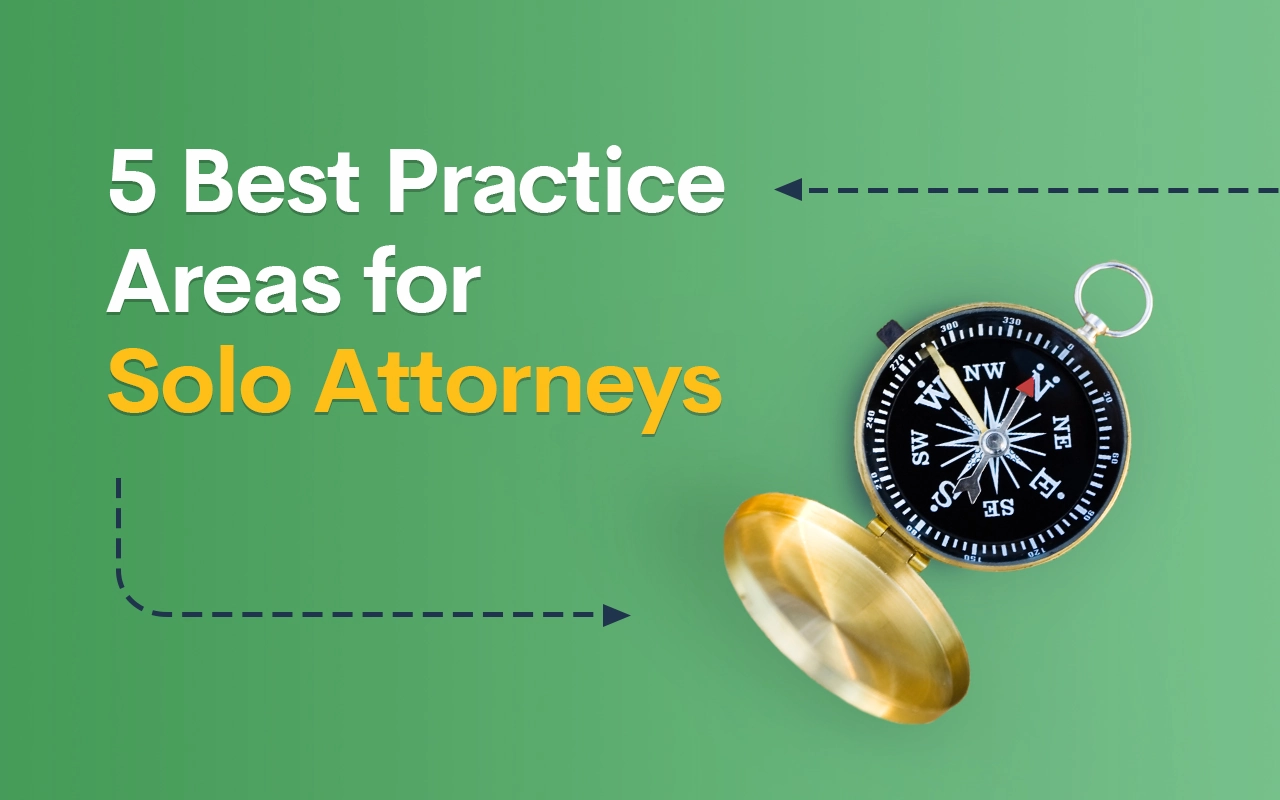5 Best Practice Areas for Solo Attorneys

Finishing law school is undoubtedly a significant achievement— yet it’s hardly the finish line. The next step is deciding where you are going to take your law degree. For many, this means making the choice to go solo since there are many advantages that come with running your own practice.
Advantages of being a solo attorney
Being your own boss
Flexibility is one of the biggest perks of running your own solo law practice. As the sole practitioner, you get to call the shots and decide what needs to get done and when. If you have a family to look after, or other projects going on, setting your own terms for your law practice can be a huge advantage compared to working for someone else. If flexibility is important to you, then going the solo route is certainly something to consider.
Lower costs
It goes without saying that the cost of your operations will be a lot lower as a solo attorney than they will be in a bigger law firm. Bigger law firms need to account for larger staff and consequently bigger expenses. Solo practitioners require less real estate (if any), fewer materials, and in some cases may not need additional staff at all. Many solo practitioners rely on law office software like CRM and client intake software to help automate day-to-day tasks that they would otherwise require extra hands for.
Better client experience
One standout reason that many clients prefer to work with solos is that they appreciate working with the same attorney who conducted their initial consultation. Larger law firms may have multiple lawyers appointed to a case. This can be disorienting and even overwhelming for clients with more sensitive cases who are forced to repeat the same potentially triggering information to various people. With a solo attorney, clients get a one-on-one experience without being strewn in multiple directions. Most importantly, solo attorneys often offer more attractive pricing, which is often one of the biggest concerns for those seeking legal representation.
What to consider when choosing which practice area to focus on
Although the main draw of becoming a solo attorney is running things your way, you also have a lot of responsibility on your shoulders which is important to remember when choosing your legal niche.
When deciding which practice area to choose, keep the following considerations in mind.
Your values
What's important to you, and what would motivate you to go into the office every day and zealously represent your clients? Do you think you could see yourself representing a potentially guilty offender? Are you ok working under extreme pressure, and are you able to stomach the harsh realities that may come along with certain cases such as those in family law? Perhaps you live for the back and forth negotiation that comes along with personal injury and want to fight for injured victims to get their lives back on track. In short, before you choose a practice area based on money alone, ask yourself whether it's something that would line up with what you care most about.
Your area
Take a look at what's going on in the geographic or metropolitan area you plan to start your business. Are there already established solo practices there? What areas do they practice in, and do you stand a chance against them competitively? Consider whether there's an opportunity for a different niche in your area that might be logical. Do you live in an area with a high poverty rate? Criminal law could potentially yield a lot of clients. Perhaps there's a high immigration rate which could be conducive to opening an immigration law practice. If you live in a town brimming with small business owners, a tax law practice might be needed in your area. The type of area and demographics in your area should come into play in order to make the most strategic decision.
Timing
What's going on in the world around you currently? Is a certain practice area more promising than others? Are there new emerging niches of law that could see a higher demand in the near future? For instance, cannabis law and liability against technology have seen rampant growth across the country. Be sure to factor in the political, social, and technological climate as you come to a decision.
Then there is the question of where you are in your life. Does your personal life afford you the bandwidth to get your business off of the ground? Do you have a family to look after? Are you able to financially sustain a business in its infancy? As they say, "read the room", and decide what kind of practice area would best suit your situation.
5 Best practice areas to consider
1Bankruptcy law
Bankruptcy law is a great choice for solo attorneys since people going through exceptionally stressful financial times are usually looking for a more personalized experience. A solo practitioner is there to hold their hand throughout the process from beginning to end with an empathetic approach to delivering legal services. Make no mistake, bankruptcy law requires a love of numbers, so if you aren’t much of a math fan, then you will likely want to consider a different practice area.
2Family law
Much like people going through financial difficulties, people going through the emotional turmoil of divorce also desire a more empathetic client experience that a solo attorney can so expertly offer. Although family law comes with heightened emotions, and a substantial amount of tension, it can also be immensely rewarding to know that you've made a difference in your clients' lives.
Not to mention from a business standpoint, the current divorce rate is over 40%. In other words, out of every six people that get married, nearly half of them will get divorced. Although rates have lowered over the last few decades it's safe to say that you'll have a wide pool of clients to market to in family law.
3Estate planning
According to the latest legal industry statistics, as of 2022, there are over 200,000 estate planning lawyers in the United States alone. If you plan on opening up your practice in an affluent area abundant in large residences and expensive cars, opening up an estate planning practice can be quite lucrative. Solo practitioners looking to get into estate planning won't just find success in upscale areas but also in counties with older demographics. These areas are ripe with residents nearing retirement intent on protecting and preparing their assets.
4Personal injury
The US Department of Justice reports that there are about 400,000 personal injury cases settled out of court every single year. While the most common type of personal injury happens on the road, you'll also find plenty of work injuries, slips and falls, and rarer injuries. People who have suffered a financial and emotional loss as a result of their injury are looking for someone to prove their case and seek compensation.
Personal injury cases require a significant amount of back and forth between insurance companies with no shortage of documentation. Financial risk is also a factor in that you could stand to earn nothing if you don't win your client's case. Conversely, there's the promise of incredibly high settlements which could mean a big paycheck. The question is, how risk averse are you?
5Immigration law
Navigating the complex world of immigration law is not easy for someone who may not even speak English. As such, an immigration lawyer is there to advise their clients on what the laws are and help them through the process of being able to live and work in the United States. Clients can range from United States citizens looking to bring their foreign spouse to the country to more sensitive cases in which immigrants are potentially separated from their families.
If you speak another language other than English, then this can be particularly appealing in your marketing strategy. Many foreign clients want to work with someone that speaks their native tongue, so you'll be even more successful if you can offer that personal touch of their native language that not all other immigration lawyers can.
Rise to the challenge with the right legal tools
Regardless of what practice area you choose, you still have to accept that you're a business person, not just a lawyer. You'll need to generate clients, do the administrative work like sending out bills, assembling documents, and onboarding clients. And while you get to choose your own hours, and get to keep your earnings, at the end of the day all of the facets of your business fall on you.
Since this can be such a daunting task for lawyers coming out of law school who don't necessarily know how to run a business, it's important that you have all of the right tools in your arsenal, especially since there's only one of you.
For this reason, the most successful solo attorneys know the importance of turning to legal technology to give their legal clients a big firm feel with a one-on-one touch. Utilizing end-to-end software is the most efficient way to put the administrative side of your law firm on autopilot, so you can focus on what you do best, which is helping people better understand the law.
The right legal technology can capture your client information for you and auto-populate it into your marketing emails, important documents, and bills, reducing time lost on the day-to-day parts of running a law firm. Best of all, it tracks each stage of the client journey, keeping you on track with what needs to happen next.
Are you ready to see how Lawmatics Client Intake and CRM software can help you build your practice and smash the competition? Sign up for a free product demo today.
Sources Cited
Miles Mason, Divorce Rates Statistics and Trends for 2022, February 23,2022
https://memphisdivorce.com/tennessee-divorce-law/divorce-rates-statistics-and-trends-for-2022/
Ibisworld, Estate Lawyers & Attorneys in the US - Number of Businesses 2002–2027, May 11, 2021
https://www.ibisworld.com/industry-statistics/number-of-businesses/estate-lawyers-attorneys-united-states/
Jacob Maslow, 7 Most Common Types of Personal Injury Cases According to Statistics, November 19, 2020
https://www.legalscoops.com/7-most-common-types-of-personal-injury-cases-according-to-statistics/


